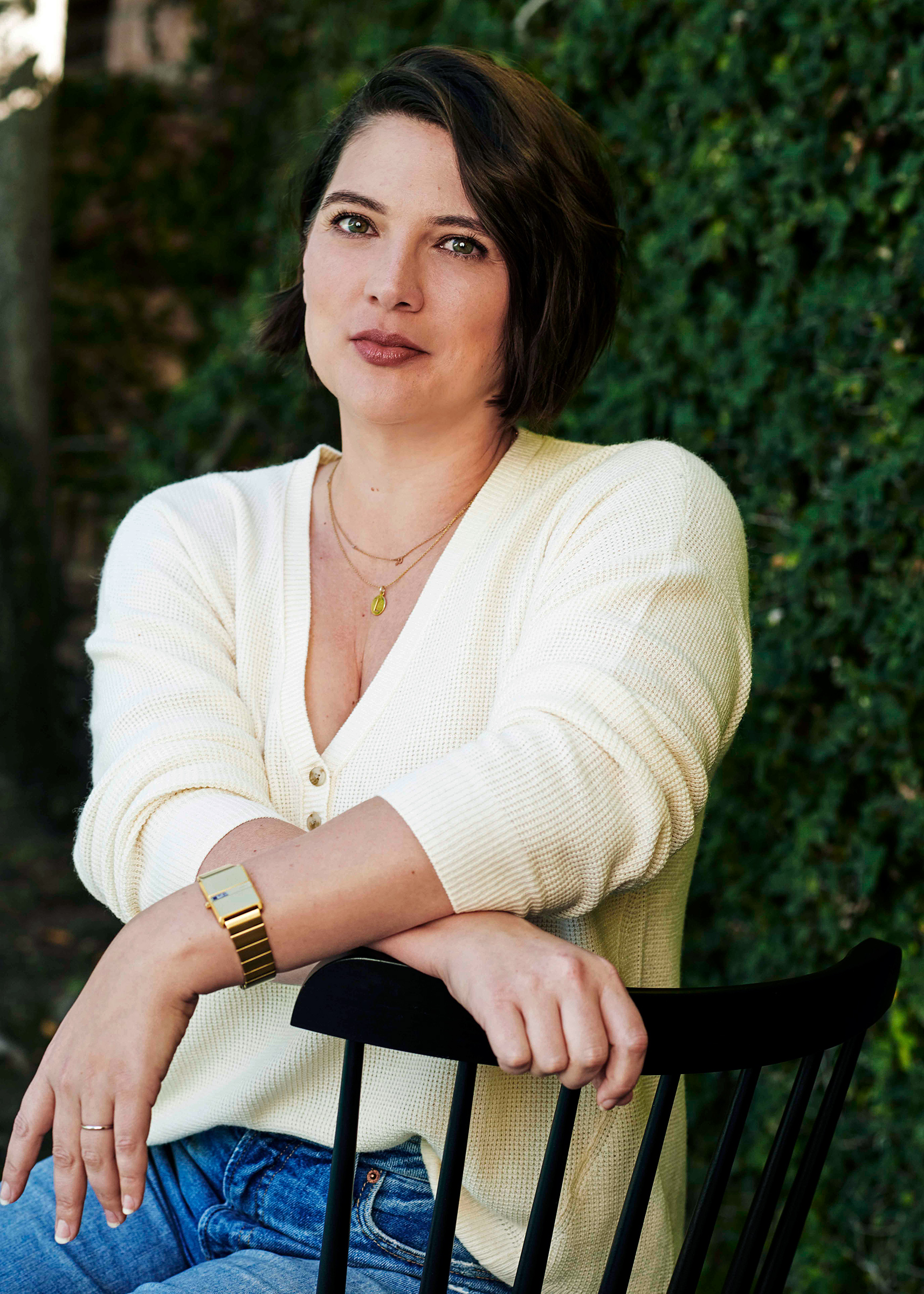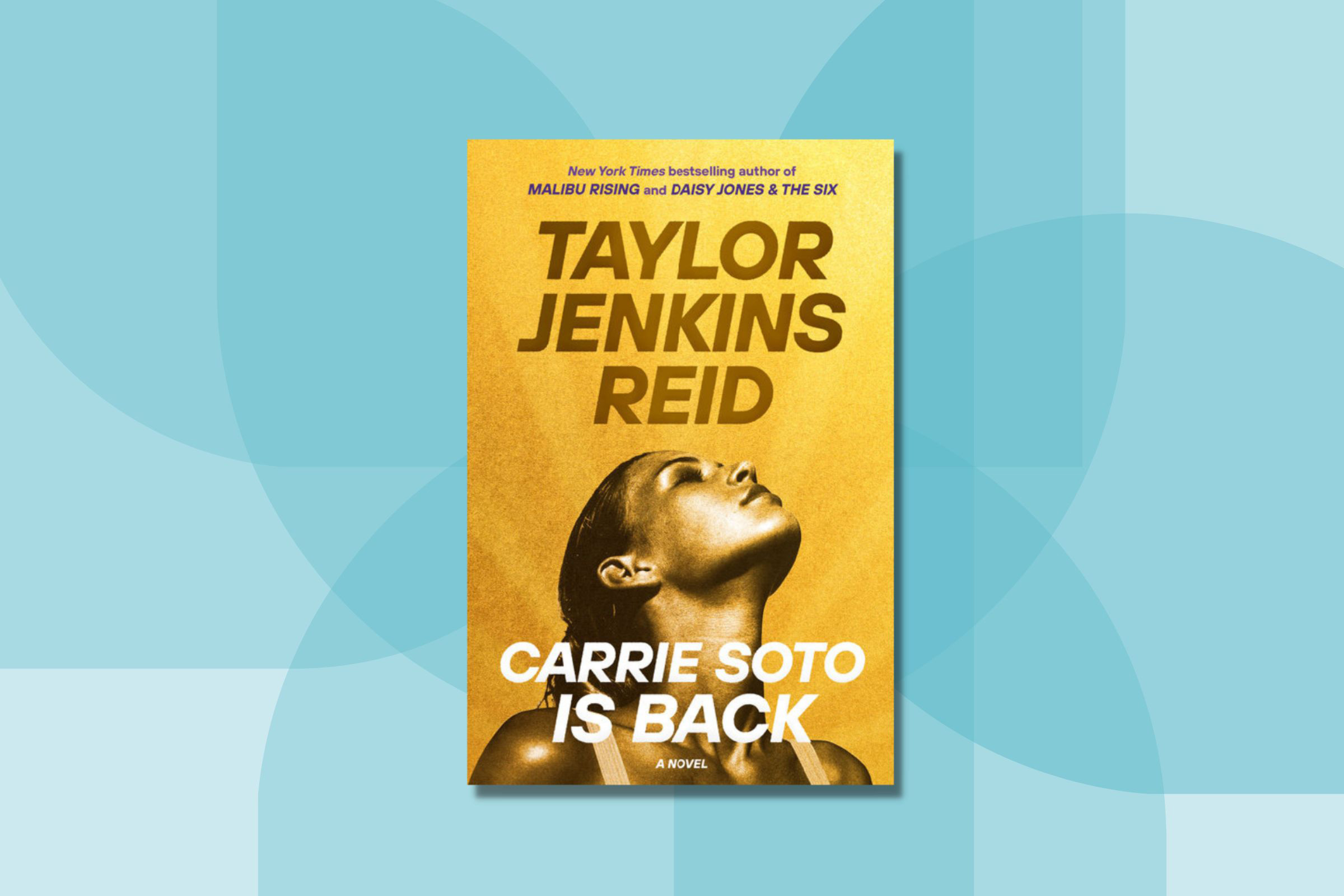
When you’ve reached the top of your game, where can you go next? It’s a question that plagues the protagonist of Taylor Jenkins Reid’s latest novel, the ’90s-set tennis drama Carrie Soto Is Back, coming Aug. 30. Carrie, now 37 years old, steps out of retirement to reclaim the record that made her a legend, just tied by a young hotshot. With 20 Grand Slams to her name, she’s desperate to live up to the reputation for dominance she once believed was unimpeachable but now feels slipping away, forcing her to reckon with how much of her identity is wrapped up in her record—and to wonder if she’s expecting too much of herself in an attempt to prove her worth to the world.
Reid, 38, knows these feelings well. She’s been working for a decade straight, churning out book after book, the last three of which, part of a quartet about famous women, have finally made the author herself a household name. Carrie Soto is the final installment in the bundle, which started with Reid’s 2017 novel The Seven Husbands of Evelyn Hugo, about a 1960s Hollywood icon who falls in love with her female co-star. The book, which has been both lauded and criticized for its representation of a queer woman of color, became a sensation on TikTok four years after it was published, shooting it to the New York Times best-seller list in January 2021 and reappearing there for 75 weeks and counting. The two novels Reid has published in the interim—2019’s Daisy Jones & The Six, about a ’70s rock band and their magnetic frontwoman, and 2021’s Malibu Rising, about a supermodel surfer and her siblings in the ’80s—have also made the best-seller list and celebrity book-club rounds; Reese Witherspoon picked the former, Jenna Bush Hager the latter. All three have adaptations in the works.
The books in Reid’s famous-women quartet stand alone, save for a few easter eggs here and there, like the mention of a Daisy Jones biography in Carrie Soto and the appearance of singer Mick Riva across all four novels. But each of the books centers a vibrant protagonist managing the tensions between her glamorous life in the public eye and the pressures she feels in private. To Reid, there’s something universal in that. “You make it a movie star, rock star, supermodel, tennis player, it’s all the same stuff we’re facing: How much of myself do I want to give, and what do I hide?” she tells TIME.
Read More: 27 New Books You Need to Read This Summer
And each of the books captures a specific time and place, with Reid meticulously collecting minute yet meaningful details to help build immersive worlds. For Carrie Soto, that meant learning as much as she could about a sport she had barely ever watched, let alone played; reading books on game strategy and technique and about the careers of Martina Navratilova, Chris Evert, Billie Jean King, and Althea Gibson; studying different playing styles and court surfaces; and watching old matches on YouTube, absorbing the language of sportscasters. Reid brings this level of intensity to all her projects: to publish eight novels in nine years—as well as co-write screenplays with her husband and work on her own adaptations, not to mention have a daughter—Reid has followed a strict timeline for each book, setting aside a certain number of weeks each for research, drafting, and revision.
It’s fitting, then, that the author decided to end the quartet that made her famous with a story about a woman struggling with her constant pursuit of success—and finally realizing it might just be too much. In detailing Carrie Soto’s evolving feelings about her tennis career, Reid underlines the toll that living under that kind of pressure can take. “This isn’t really a story about whether Carrie can win a [grand] slam right?” she says with a knowing look.
“It’s about whether she can stop climbing mountains.”
Reid likes that visual: climbing mountains. She’s oriented her entire adulthood around it. Growing up, she was fascinated by Hollywood gossip, so she studied film in college in Boston and then moved to Los Angeles, where a four-year stint in casting gave her a window into the lives of the rich and famous, as well as of the dehumanizing realities of working with certain “big personalities.” It was then that she realized she didn’t want to bring other people’s stories to life—she wanted to write her own. At 24, she wrote her first book, which ultimately didn’t sell. But she wasn’t fazed. “Nothing was stopping me,” she says. “There was a target, and I was going to get it.”
That determination has propelled her ever since. Eight novels later, she’s gained a massive following of readers who are obsessed with her escapist narratives full of dramatic twists and entertaining dialogue. And she’s found her way back to Hollywood in exactly the role she wanted. Reid and her husband Alex Jenkins Reid wrote the script for the film adaptation of her 2016 novel One True Loves, which was shot last year starring Phillipa Soo and Simu Liu. The television adaptation of Daisy Jones, with Riley Keough and Sam Claflin playing bandmates Daisy and Billy, wrapped filming last spring. Malibu Rising is set up at Hulu and Little Fires Everywhere showrunner Liz Tigelaar is set to adapt Evelyn Hugo for Netflix.
Reid has, without planning it, become an IP machine, pumping out novels that readers can’t get enough of during an era when Hollywood is insatiably hungry for material to adapt. The concept of success can take on a malleable definition for authors—gratification can come with any number of readers, big or small, finding your work. But in Reid’s case, it’s quantifiable: 5.4 million copies of her books in print in the U.S.; her work published in 36 languages.

Success has not come without criticism, which Reid has faced for writing novels that center characters who do not share her identity. Her most popular book, Evelyn Hugo, is about a bisexual Cuban American. Carrie Soto Is Back features multiple Spanish-language exchanges between Carrie and her Argentinian father. Reid, who is white and straight, says she has heard from readers who are appreciative of the representation, as well as those, including some of her own friends, who range from skeptical to downright angry about it. She’s one of many authors whose work is brought up in the context of a larger debate in the publishing industry about who has the right to tell which stories. For her part, Reid feels strongly that writing books that center only straight white women—thereby relegating women of color and queer characters to sidekick or peripheral roles—is not the right choice for her. “I’m not arguing that a white woman writing women of color is automatically the right answer. There is no good answer,” she says. “I’m trying and figuring it out with the awareness that my intention to create good representation does not mean I have done it right. I come to it conflicted and open to criticism.”
Like many authors who have reached mainstream success, she sometimes lends her platform, highlighting other authors’ work or featuring their voices on her social media, and she took a public stance on the importance of casting a Latina actor in the role of Evelyn Hugo. “I try to do whatever small thing I can do,” she says. “Ultimately, the true goal here is that women of color are empowered to tell their stories and given the attention and opportunity that a white woman like me is given.”
Midway through Carrie Soto Is Back, the protagonist starts to wonder if her ambition has spun her life out of control. She’s on a run in Palm Springs, where she has tucked herself away to train for the French Open, and she feels like she can’t catch a break. Her knee is acting up; she just lost in Australia; her father, also her coach, is hounding her for being too impatient on the court; and her manager just informed her that one of her sponsorship deals is at risk. She’s lost the sense of joy that used to come with playing the game.
Reid questions her own ambition at times too. For all the goals she sets and chases, she finds the moment when she’s finally achieved one to be surprisingly hollow. “My happiest moment is not when I’m standing at the top of a mountain,” she says. “It’s when I’m just about to get there. When I’ve worked so hard and it’s just in sight—and I have to keep working still.”
Her husband has a specific look he gives her when she announces a new idea for a project—a sort of “Here we go again” expression. And she’s been promising her friends for years that she’ll take time off, to the point that they no longer believe her. But Reid emphasizes that the pressures women experience fighting for a place in any field are real, and once you start reaching success, it can feel impossible to stop striving. “We say, Oh, look at how productive she is. Look at how hard she’s working. Look at how much she’s been given and how much she’s made,” she says. “Nobody is saying, Oh, look at her just be.”
But now that her quartet is finished, Reid is determined to rest—albeit in her own productive way. She’ll read more books: classics she never got around to, and the work of her contemporaries that she’s missed. She’ll try living a little to have something new to write about. “I want to have that feeling where I’m not itching to get to the computer because I want to feel like I did something today—I’m itching because I have so much I want to say,” she says. But there’s an edge, even in this. “The next time I have a book come out,” she says, “I want to show up and be a different writer.”
Correction, August 22
The original version of this story mischaracterized Liz Tigelaar’s involvement in adapting Taylor Jenkins Reid’s work. Tigelaar is involved in the adaptation of Evelyn Hugo, but not of Malibu Rising.
More Must-Reads From TIME
- The 100 Most Influential People of 2024
- The Revolution of Yulia Navalnaya
- 6 Compliments That Land Every Time
- Stop Looking for Your Forever Home
- If You're Dating Right Now , You're Brave: Column
- The AI That Could Heal a Divided Internet
- Fallout Is a Brilliant Model for the Future of Video Game Adaptations
- Want Weekly Recs on What to Watch, Read, and More? Sign Up for Worth Your Time
Write to Annabel Gutterman at annabel.gutterman@time.com